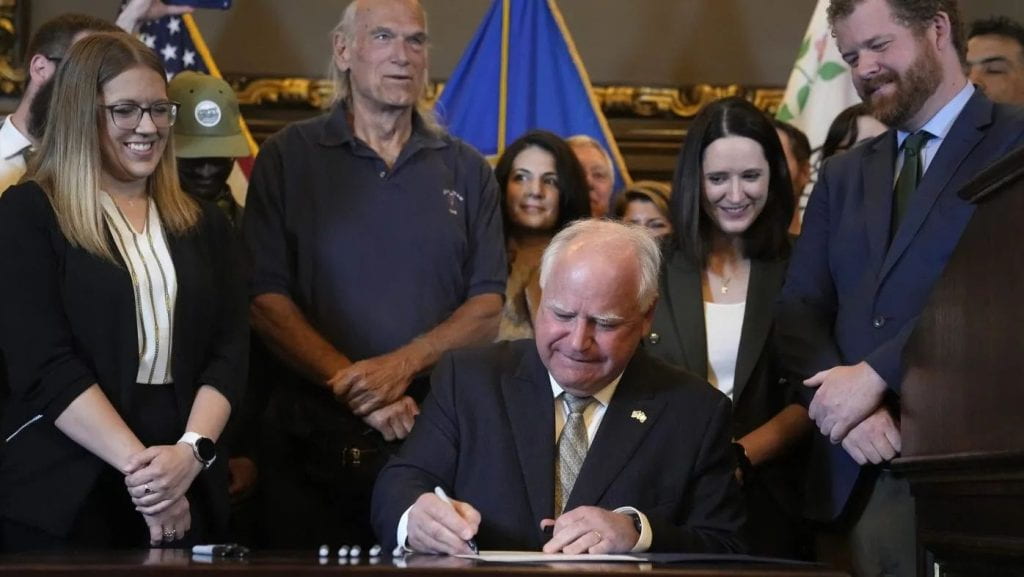Seven in ten American voters support the legalization of marijuana, highlighting a significant divide between public opinion and the federal government’s stance. Despite this popular sentiment, the 1970 Controlled Substances Act classifies marijuana as a Schedule 1 drug, deeming it federally illegal due to its high potential for abuse.
Several states have challenged this federal stance, legalizing marijuana for medical and recreational use within their borders. However, even in states where marijuana is legal, it remains a federal offense. Federal officials, concerned about public health risks, don’t support nationwide legalization.
Oregon stands out as the first state to decriminalize small marijuana possession, making it similar to a minor traffic offense. In 1998, Oregon also became one of the first states to legalize medical cannabis through Ballot Measure 67 (Marijuana Policy Project (MPP)).
Recently states in the midwest have also made advancements. In 2020, Illinois permitted adults over 21 to buy marijuana for recreational use, aligning with its existing medical marijuana laws. Similarly, Minnesota joined the other states when Governor Tim Walz signed House File 100 into law on May 30, 2023.

Governor Walz (Minnesota) signs bill legalizing marijuana
As marijuana legalization gains momentum, it is crucial to acknowledge its positive impacts on both the economy and society when advocating for federal decriminalization. Beyond social and economic benefits, legalization creates job opportunities, fosters social justice, and has demonstrated crime reduction in some states.
For example, Illinois generated $443 million in tax revenue within the first year of legalization, this shows the economic potential. And, in Ohio there could be an annual boost of $260 million to its economy upon marijuana legalization. (New York Times)
Federal decriminalization also holds potential social justice benefits. According to the Marijuana Policy Project Someone is arrested for a cannabis offense every two minutes, and in 2022 There were 225,000 marijuana arrests in the country. 92% of these arrests were for just cannabis possession. And there have been over 600,000 annual marijuana arrests in the last two decades, Black individuals are disproportionately affected, facing four times higher arrest rates than their white counterparts, despite similar usage rates (CAP 20). Decriminalization could address this racial disparity perpetuated by the war on drugs.
Overall, the federal government should consider the economic and social justice advantages when contemplating the decriminalization and legalization of marijuana. With public support exceeding 50%, elected officials bear the responsibility to represent the majority’s interests and evolve federal policies in line with changing societal attitudes.
Works Cited
Marijuana Policy Project – We Change Laws!, https://www.mpp.org/. Accessed 14 December 2023.
“The Facts on Marijuana Equity and Decriminalization.” Center for American Progress, 20 April 2021, https://www.americanprogress.org/article/facts-marijuana-equity-decriminalization/. Accessed 14 December 2023.
“In the Weeds.” Rockefeller Institute of Government, https://rockinst.org/intheweeds/. Accessed 14 December 2023.
McGraw, Daniel. “Ohio Is Voting on Whether to Legalize Recreational Marijuana.” The New York Times, 7 November 2023, https://www.nytimes.com/2023/11/07/us/politics/ohio-marijuana-vote.html?searchResultPosition=4. Accessed 14 December 2023.
Peltz, Jennifer. “U.S. regulators might loosen restrictions on marijuana. Here’s what that would mean.” PBS, 31 August 2023, https://www.pbs.org/newshour/politics/u-s-regulators-might-loosen-restrictions-on-marijuana-heres-what-that-would-mean. Accessed 14 December 2023.
“Controlled Substance Act.” PubMed, 24 March 2023, https://pubmed.ncbi.nlm.nih.gov/34662058/. Accessed 15 December 2023.
“H.F. 100.” Minnesota House of Representatives, https://www.house.mn.gov/hrd/bs/93/hf0100.pdf. Accessed 15 December 2023.
“Parks and Recreation Department Budget Shortfall and Park Closures.” Parks and Recreation Department Budget Shortfall and Park Closures, 2 April 2016, https://www.oregonlegislature.gov/lfo/Documents/ReportOnMarijuanaPrograms0429_2016.pdf. Accessed 15 December 2023.“Which States Are Riding The Recreational Marijuana Wave?” CBS News, 6 November 2019, https://www.cbsnews.com/chicago/news/which-states-are-riding-the-recreational-marijuana-wave/. Accessed 15 December 2023.